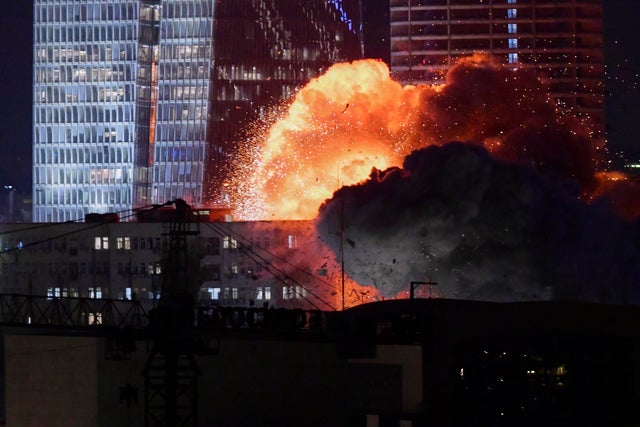
Escalation in the Middle East: Missiles Rain Down as Israel and Iran Exchange Blows
The situation in the Middle East has taken a dramatic and dangerous turn. As I speak, tensions between Iran and Israel have exploded into one of the most intense military exchanges we've seen in decades. And what’s more alarming—Baghdad is once again in the crossfire, not as a battlefield, but as a front-row spectator to a regional crisis that’s threatening to pull the entire region into chaos.
Here’s what’s happening right now. Iran launched dozens of ballistic missiles targeting Israel, some of which managed to bypass the Iron Dome missile defense system and hit the heart of Tel Aviv. The strikes came as retaliation after Israel carried out an unprecedented air assault on Iranian territory, striking nuclear facilities and reportedly killing top Iranian military commanders.
In the middle of this storm, U.S. bases were put on high alert. American troops stationed at Union III in Baghdad's Green Zone were ordered into bunkers for safety, a chilling reminder that this is not a distant conflict—it’s right on Iraq’s doorstep. Baghdad, once a symbol of war and resilience, is now witnessing its role shift in this new conflict era. The city's proximity to U.S. military interests and its political complexity makes it a potential flashpoint if the confrontation escalates further.
Israel's attack, named "Operation Rising Lion," was massive. Over 200 fighter jets dropped more than 330 munitions, targeting over 100 locations inside Iran. The goal? According to Israeli officials, it was to dismantle Iran’s ability to produce nuclear weapons and disrupt its military leadership. They claim to have hit enrichment sites, missile production facilities, and even eliminated top generals in the Iranian armed forces.
Also Read:- Pride Night Lights Up as Houston Dash Face Off Against San Diego Wave
- Stunning Aurora Alert: Northern Lights May Dazzle 18 U.S. States This Weekend
Iran's response was swift and fierce—more than 100 drones and ballistic missiles launched toward Israel, including Tel Aviv. While Israel intercepted many, the ones that broke through caused fires, building collapses, and injuries. At least 21 Israelis have been reported hurt, with some in serious condition.
Back in Baghdad and across U.S. installations in the region, forces braced for more. The U.S. has clarified that it did not participate in the Israeli strikes, but American officials did inform allies in the region ahead of the attacks. The Biden administration, like the Trump administration before it, maintains that diplomacy—not warfare—is the preferred path.
But diplomacy may now be slipping away. Iran’s leadership has promised more retaliation. Its president called for a "strong and wise" response, and Ayatollah Khamenei declared that Israel would be left "helpless." With nuclear sites, air defense systems, and key military figures already hit, Iran is under intense pressure to hit back harder.
What’s at stake here isn’t just Iran and Israel. The region is a tightly wound web of alliances, grudges, and flashpoints. Groups like the Houthis in Yemen and Hezbollah in Lebanon are known proxies of Iran and could be activated in a wider conflict. U.S. interests, from embassies to military bases scattered across the Gulf, are all potential targets.
And so, Baghdad is once again caught between history and the future. It’s not being bombed—but the tension is palpable. The Green Zone is alert, troops are in bunkers, and Iraqi leaders are watching with concern, knowing that any wrong move—any misfire—could ignite new chaos in a country that has just begun to rebuild.
This isn’t just another round of regional hostilities. It’s a clear message: the rules of engagement are changing, and no city in the region—Baghdad included—is immune from the ripple effects. As the world watches Tel Aviv and Tehran, Baghdad listens for the sirens and wonders what comes next.
Read More:



0 Comments